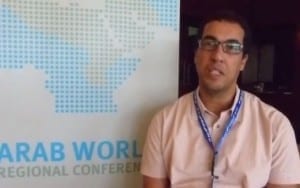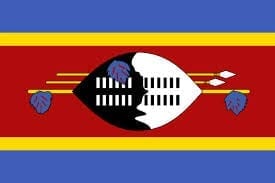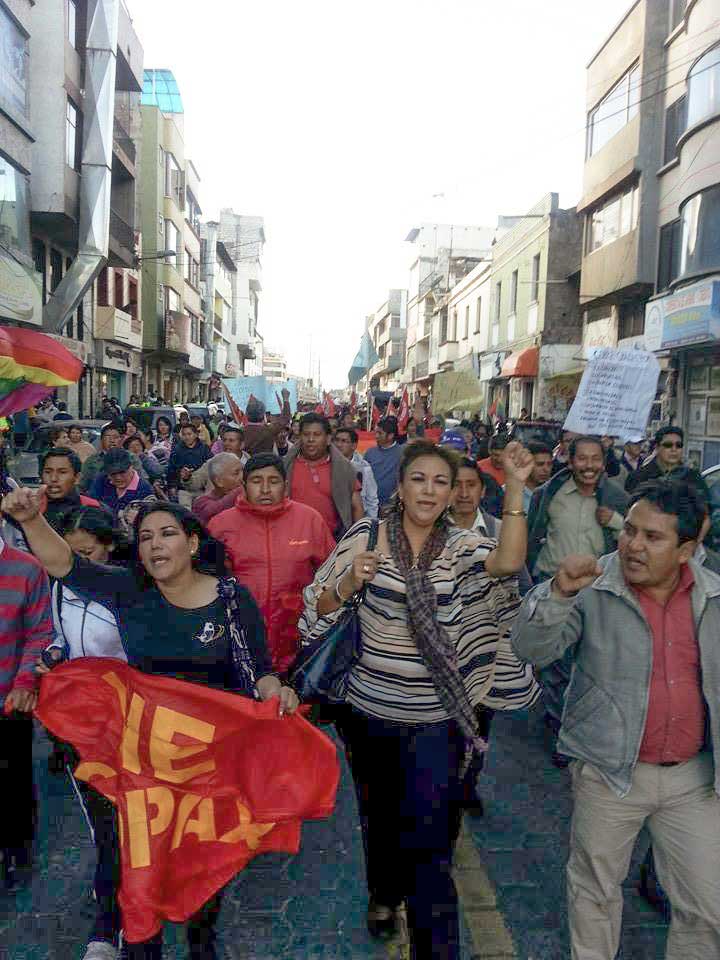Sep 29, 2014
[Read the full report in English and in Arabic.]
The Word Bank released a draft labor safeguard in July 2014. After consultations, a revised version will be released in 2015. The global labor movement and the International Labor Organization (ILO) are concerned about some significant gaps in the draft labor safeguard, specifically that it does not guarantee freedom of association and the right to organize and bargain collectively, and that the safeguards would not apply to contract workers. This is in stark contrast to the labor safeguards of other lending bodies, such as the International Finance Corporation (IFC) and the European Bank for Reconstruction and Development and the African Bank for Reconstruction and Development. While the World Bank professes a reluctance to infringe upon a country’s sovereignty, the vast majority of World Bank’s members are also ILO member states, and therefore already committed to the principle of freedom of association.
The need for a World Bank mechanism to support loan recipients to uphold this principle is illustrated by the example of the electricity sector in Iraq. In 2007, the World Bank awarded the Iraqi government a $124 million loan for reconstructing and rehabilitating the electricity sector. During the loan period, the Iraqi government carried out a campaign against the electricity unions in an attempt to silence them for bringing to light the issue of widespread corruption in the sector. As workers’ right to freedom of association was stifled, so was the ability to raise concerns with the project through a clear grievance mechanism, such as those guaranteed through IFC private-sector loans.
Deterioration of Electricity Supply Spurs Widespread Protests
In 2008, the electricity unions began organizing rallies throughout Iraq to protest the deterioration of the services provided to citizens, called for sectoral reform and decried financial and administrative corruption reportedly to be rampant at the ministry. In public statements, the unions reported false contracts and power stations that were supposed to be built, but never were. In mid-June 2010 a wave of protests and demonstrations against the ill-equipped electric power generation and distribution system swept the country. In Basra, two demonstrators were killed and three others wounded. Although the official media reported this as an accident, when the Provincial Council security fired shots in the air to disperse the crowd, demonstrators said the security forces opened fire on the protestors.
As a result of these incidents, former Minister of Electricity Kareem Waheed resigned from office on June 21, 2010. One day after his resignation, the Iraqi Council of Ministers commissioned Hussein al-Shahristani to serve as the acting Minister of Electricity in addition to his oil portfolio. On July 20, 2010, shortly after Shahristani took charge of the Ministry, the Ministry issued Order No. 22244, which banned freedom of association in the ministry and stopped all forms of communication with the trade unions in the ministry or in any of the affiliated directorates and areas.
The ministry ordered all electricity departments and directorates to shut down the trade union offices and seize their assets, documents, property and computer software. The most severe form of repression was to grant the right to the relevant directorates to take immediate legal measures and refer anyone threating or using violence or vandalism to court by virtue of Articles 2 and 4 of Anti-Terrorism Law No. 13 of 2005. Treating trade unionists as terrorists set a dangerous precedent whereby any sit-in, picket or strike could be interpreted as an act of vandalism, and any trade unionists involved in such an act could be prosecuted under the Anti-Terrorism Law.
Retaliation against Unions
Based on this new directive, the army and police forces raided the electricity trade union headquarters in several governorates, particularly in Basra, Thi-Qar, and at the ministry’s headquarters in Baghdad. These forces broke into the trade unions’ offices, broke their doors, changed the locks and seized all the trade unions’ assets and documents. But the Ministry of Electricity never produced evidence for the accusations it made against the electricity unions, and no trade unionist has been taken to court over these accusations.
The denial of freedom of association and the right to organize and bargain collectively in the electricity sector in Iraq has been devastating for the unions and workers and the nation. The government-led public misinformation campaign accusing unions of corruption and terrorism tarnished the unions’ reputation, and led to a significant decline in membership. Electricity-sector workers are suffering a backsliding of working conditions previously established through union efforts. For example, the return of a large temporary workforce that has fewer benefits and no union representation. Iraqi citizens are suffering, as the government continues to deal ineffectively with electricity supply issues, an area in which workers are important stakeholders and valuable partners in suggesting and implementing system improvements.
This example highlights workers calling for government accountability in the face of severe repression and how unions take an essential role in the reconstruction of a democratic society. Civil society organizations play an essential role in ensuring good governance in a country, an observation the World Bank has emphasized repeatedly in the wake of the so-called “Arab Spring.” The World Bank should demonstrate commitment to ensuring space for robust civil society institutions by adopting safeguards that would protect freedom of association in all its lending.
Sep 25, 2014

Said El Hairech, general secretary of the National Union of Port Workers, jailed for union activity in 2012 is now celebrating a new bargaining pact. Credit: ITF
Dock workers in Tangiers, Morocco, successfully negotiated a collective bargaining agreement yesterday after a two-year struggle for worker rights that involved the wrongful arrest of union leaders for union activity and an international campaign to free the two men.
Significantly, the new pact with the global port operator APM Terminals includes respect for trade union rights along with a commitment to social dialogue, according to Said El Hairech, general secretary of the National Union of Port Workers (Union des Syndicats des Transports), an affiliate of the Moroccan Labor Union (UMT) and of the International Transport Workers’ Federation (ITF). The agreement with APM, a global network that employs 20,300 employees in 67 countries with interests in 70 port and terminal facilities, also improves working conditions and paid time-off for trade union representatives.
“This CBA embodies what we want—dynamic economic and social objectives,” said El Hairech, who also is chairman of ITF’s Arab World Regional Conference.
In 2012, El Hairech and Mohamed Chamchati, general secretary of UMT’s Merchant Seafarers’ Union, were arrested and imprisoned before eventually being released in October and November after the ITF launched a global solidarity campaign in support of the two men. The Solidarity Center worked to raise awareness about the campaign along with the UMT, a longtime ally.
The cargo port of Tangier-Med is a flagship development project for Morocco that has attracted significant international investment, and El Hairech says the agreement makes it clear that “union and management are working towards a common goal here: ambitious economic expansion in the framework of a common perspective on social responsibility.”

Sep 24, 2014
Workers continue to be sickened at a Swazi textile factory where dozens of workers required hospitalization earlier this month after the plant began using the dangerous chemical butyl acetate to clean clothing stains. The workers, who went to the hospital at their own expense, reported chest pains, severe headaches, vomiting and bleeding, and some collapsed.
Despite the severity of the symptoms and the number of workers affected, the union says management ordered workers back on the job before a thorough health investigation was completed. The company has denied paid sick leave to workers, including one woman who developed bloody blisters in her mouth. Union shop stewards report that the dangerous working conditions have not been addressed and workers continue to become sick, with some vomiting blood. A pregnant worker who experienced swelling was told by doctors in intensive care that her baby may not be breathing.
Butyl acetate, a flammable liquid which targets the central nervous system, should not come in contact with eyes or skin because it causes headaches, skin and eye irritation, affects the upper respiratory system and can cause unconsciousness, according to the U.S. Centers for Disease Control and Prevention.
Shop stewards from the Trade Union Confederation of Swaziland (TUCOSWA), which represents the workers, met with Ministry of Labor officials and managers at the Tex-Ray plant after the initial incident. They requested that all the employees receive medical checkups but say the company provided only a few doctors at the site and assured government officials that a health and safety committee operated in the plant, although one was not created until after workers became ill.
The company has minimized the severity and extent of the illnesses, TUCOSWA leaders say, by reporting fewer incidents of illness to the government and insisting that some workers are ill from other causes. To make up for lost production at the plant, union leaders say the company is forcing workers to toil on day and night shifts. Some 1,600 textile workers produce fleece jackets, knit tops and pants, and children’s clothes at the plant, one of nine garment and fabric factories the company runs in Swaziland.
The plant is based in Matsapha, where most of the country’s industrial factories, primarily textile production, are centered. Workers responding to a recent TUCOSWA survey among 400 textile workers in Manzini, near Matsapha, report they work in harsh and sometimes abusive conditions and say labor laws are routinely violated.
In June, the United States suspended trade benefits to Swaziland, citing the country’s serious worker and human rights violations.The benefits, known as the African Growth and Opportunity Act (AGOA), provide key economic support for countries such as Swaziland.

Sep 24, 2014
When President Obama spoke yesterday at the 2014 Clinton Global Initiative about the value of civil society and the necessity of developing young civil society leaders, the first person he recognized as contributing to the development of his community was Solidarity Center fellow and Kenya social justice activist Walid Ahmed Ali.
Commending him for his work creating jobs at the Kenya-Somali border for unemployed youth, Obama said Ali told him he “strives not just for the idea of democracy,” but “to cement the practice of democracy.
“We thank you Walid for your extraordinary efforts and we stand with you,” the President said.
Ali has been in the United States for the past four months, where he spent the first six weeks at the University of California-Berkeley on a Mandela Washington Fellowship through the Young African Leaders Initiative. He then won an internship through IREX, enabling him to work for the past two months at the Solidarity Center.
Ali, who founded the Lamu Youth Alliance, offers jobless young workers counseling, business classes and small plots of farm land to support themselves in their communities in and around Lamu.
Just off Kenya’s eastern coast, the Lamu archipelago is an environmental oasis where farmers and fishers maintain the livelihoods that have supported their families for generations. Yet a government initiative to turn the area into a massive transportation hub while bringing in tens of thousands of overseas workers to build and operate it, threatens to displace Lamu residents, wreak havoc with the environment and damage the cultural heritage of Lamu Old Town, a World Heritage site UNESCO describes as “the oldest and best-preserved Swahili settlement in East Africa.”
“The indigenous community was evicted for the project and there was no compensation, no training for other jobs,” Ali says. The Lamu Youth Alliance joined the Save Lamu network, a coalition working to develop a bio-cultural community protocol (BCP) to document community practices, rights over communally managed lands and traditional knowledge.
Ali, 29, returns Saturday to Lamu, where he will continue his efforts to push for job creation, especially for the country’s young workers, the vast majority of whom are not employed in the formal economy. Unemployment in Kenya stands at 40 percent, and 70 percent of people unemployed are young workers between the ages of 15 and 35.
Yet despite the country’s dire need for jobs, Ali says half of the 1.5 million workers who will be employed on the Lamu Port Southern Sudan Ethiopia Transport corridor project (LAPSSET) are expected to come from China. The project, slated to become Kenya’s second largest transportation hub, did not go through a procurement process, Ali says, and the wages for the project’s workers do not meet the country’s minimum wage laws.
“I am not against the project, but I want the project to be done according to protocol,” he says.
Ali, who ran for public office last year in his local ward—coming in second among 12 candidates despite being significantly outspent by the winner—will continue working toward his bachelor’s degree in development at the Technical University of Mombasa in Kenya, where he attends classes at night. During the days, he plans to carry on his work with youth by empowering them with leadership skills, increasing their understanding of sustainable development and promoting their rights with the goal of bringing positive change to Kenya.
“My concern is to promote social rights and justice and also gender equality,” he says. “I want to be a good leader with a very strong potential for assisting my community.”

Sep 23, 2014
More than 20,000 trade union members and other Ecuadorans protested regressive government reforms in Quito, the capital, last week, with simultaneous marches in seven other cities.
Those taking part in the rallies oppose proposed constitutional amendments, such as one which would deny new civil service employees rights under the country’s Labor Code, and they object to efforts to pass a proposed Labor Relations Law (Ley Orgánica de Relaciones Laborales) before details of the law are made public.
They also oppose the president’s Executive Decree 16, passed in June 2013, which subjects all nongovernmental organizations to increased oversight and gives the executive branch broad powers to dissolve organizations that it says threaten public peace or interfere with public policy.
Spearheaded by Ecuador’s union movement, including the United Workers Front (Frente Unitario de Trabajadores, FUT) and the Inter-Union Committee (Comité Intersindical ), the march drew support from a broad civil society coalition that included indigenous people’s organizations, teachers, students, medical professionals, retirees and unemployed workers. In a statement calling for the national march, FUT noted that despite the country’s economic gains, largely from lucrative oil exports, and increased government investment in public infrastructure, citizen’s livelihoods have not improved and fundamental rights continue to be constrained.
The proposed Labor Relations Law has not been open to civil society input since it was announced by the Ministry of Labor in May 2013. It is expected to move to the legislature in November.
Declaring the popular protests an attempt to destabilize the country, President Rafael Correa ordered massive deployment of authorities to stop the marches. According to two student organizations, the Federation of Secondary Students (La Federación de Estudiantes Secundarios del Ecuador, FESE) and the Federation of University Students (Federación De Estudiantes Universitarios Del Ecuador, FEUE), at least 100 students were detained by police.
The Inter-Union Committee is comprised of four national unions (sugar, water, municipal and provincial government workers unions); two provincial federations (Esmeraldas and Pastaza); and 50 workplace level unions.
Inter-Union Committee affiliates participating in marches included sugar workers in Milagros; provincial government employees, municipal employees and hospital, water and sanitation workers in Cuenca; water and sanitation workers in Santa Isabel; sugar workers, municipal workers and rural workers in Loja; water and sanitation workers in Manta; provincial government workers in Guayas; and municipal workers in Esmeraldes.
Provincial government unions active in the Inter-Union Committee also sent delegations of workers to participate in the marches in Quito, including workers from Azuay, Guayas, Morona, Pastaza and Imbabura.




